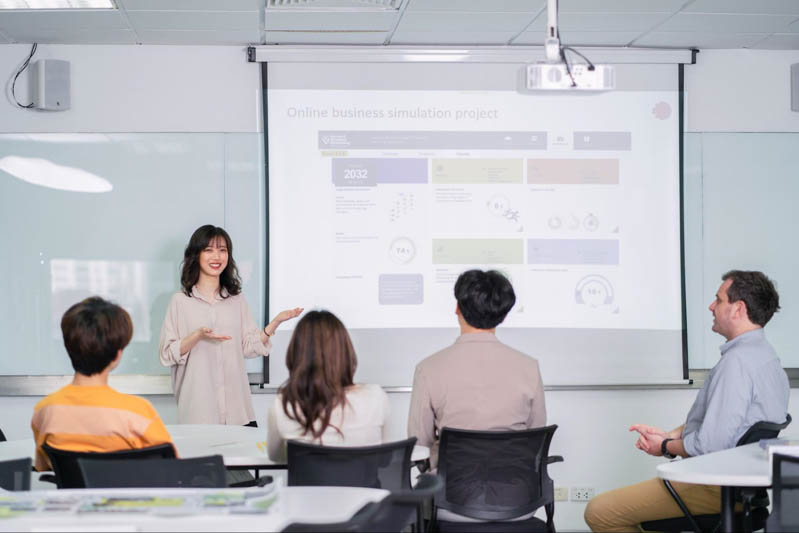
Economics is the backbone of society and there is always a demand for high-quality human resources regardless of the social context. In recent years, with the shift towards digitalisation and the electronic transformation of economic sectors, professionals with both diverse and specialised economic knowledge and technological skills are in high demand.
Several fields attracting high-quality personnel with expertise in economics include Finance, Banking, Accounting, Auditing, Valuation Economics, Real Estate Economics, Labour Economics, Human Resource Management, Commerce, International Business, Foreign Trade, Tourism and Marketing.
To address growing demand, many universities now offer courses in economics. RMIT University stands out as a top choice, providing high-quality programs and a modern learning environment for students.

A Bachelor of Economics is a degree honoured to individuals who have completed an in-depth educational program in economics. When you undertake a Bachelor of Economics, you will be equipped with extensive knowledge of economics as well as the necessary skills to seize future employment opportunities. At RMIT Vietnam, Economics is a popular major within the Bachelor of Business program, chosen by many students each year.

If you plan on studying Economics in an international university environment or wish to gain an internationally recognised degree, RMIT Vietnam might be the right choice for you. The Economics major in the Bachelor of Business at RMIT Vietnam offers you the opportunity to stand out in the job market by training you in technology that will be required for your work.
The Bachelor of Business program currently attracts significant interest and enrolments and is considered a flagship program at RMIT Vietnam.
When studying the Bachelor of Business program at RMIT, you are not required to choose a fixed major. Instead, you can tailor your study path towards your interests and goals, with the option to pursue up to two majors or up to two minors.
In addition, with the Bachelor of Business program, students can

While studying the Bachelor of Business program at RMIT, students will delve deeply into the interconnections between various business activities within organisations and enterprises across specific segments. Students will learn both the theory and practice of business, equipped with the knowledge and skills necessary to develop innovative and sustainable strategies in the global business setting.
A highlight of the Bachelor of Business program is that students start specialising in their major from the first year and can complete the program within three years. The curriculum comprises a total of 288 credits, encompassing up to 24 courses. Among these, there are four core compulsory courses:
Note that these courses are subject to change, and the Bachelor of Business program contains the most up to date information.

Students undertaking the Bachelor of Business usually experience the following:
Academic requirements: Graduation from the national high school program with a Year 12 grade point average (GPA) of 7.0 or above.
English language requirements: Completion of the Advanced level of the English for University program at RMIT Vietnam; or completion of one of the following English language certificates:
Requirements are subject to change. Please refer to the Bachelor of Business program page for the most up to date information.

The curriculum at RMIT integrates both on-campus and online learning experiences, providing students with a comprehensive educational experience. Students will attend in-person classes at the university while also engaging with online platforms.
Throughout the learning path, students will participate in activities such as group discussions, role-playing, learning from guest lecturers, attending intensive sessions and delivering presentations. These methods not only maximise knowledge retention but also help develop essential skills, creating a condensed and multidimensional learning environment.
The business sector currently has a high demand for skilled professionals. Employment opportunities are abundant, offering a wide array of career choices. Prominent roles in this field include business development, business analysis, financial management, international business, trade relations, operations management, sales and marketing.

The salary for a Bachelor of Business graduate typically ranges from 8 to 30 million VND, depending on skills and job position.
In Vietnam, the starting salary for recent graduates in the business field generally ranges from 8 to 12 million VND per month. Individuals with experience can earn between 15 to 20 million VND per month. Higher positions, such as heads of department or directors, often have salaries starting from 20 million VND per month.
RMIT offers two types of postgraduate programs- Master programs and graduate certificates and diplomas.
The Master programs include the Master of Business Administration (MBA), Master of International Business (MIB), and Master of Artificial Intelligence (MAI). RMIT offers graduate certificates in Business Administration and International Business.
The postgraduate programs at RMIT are designed to cater to the individual needs of each student, featuring flexible schedules, innovative teaching methods and numerous opportunities for studying abroad.
The above information provides detailed insights into the Bachelor of Business program at RMIT Vietnam. We hope you consider RMIT as the place to launch your dreams and shape your future.